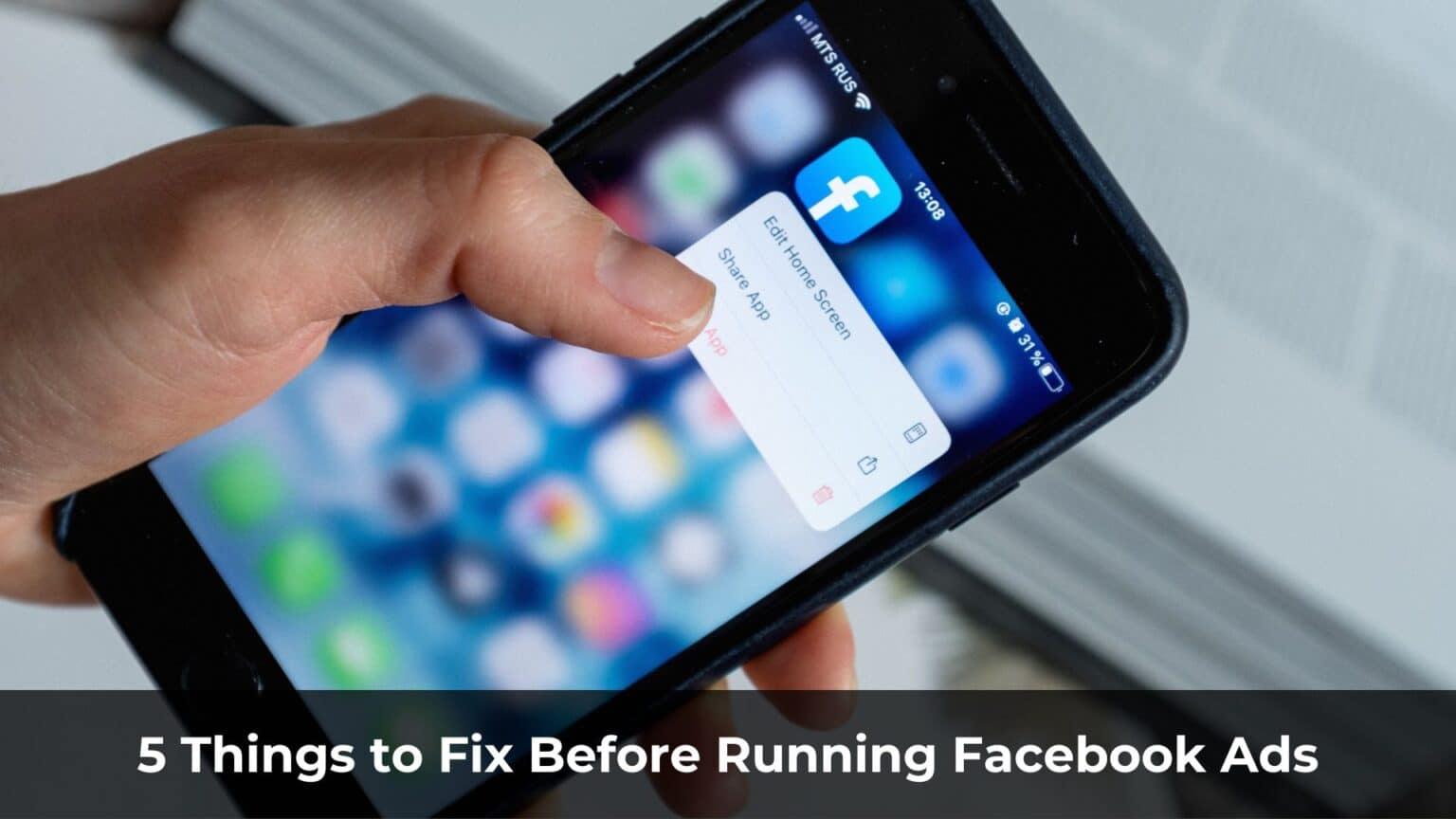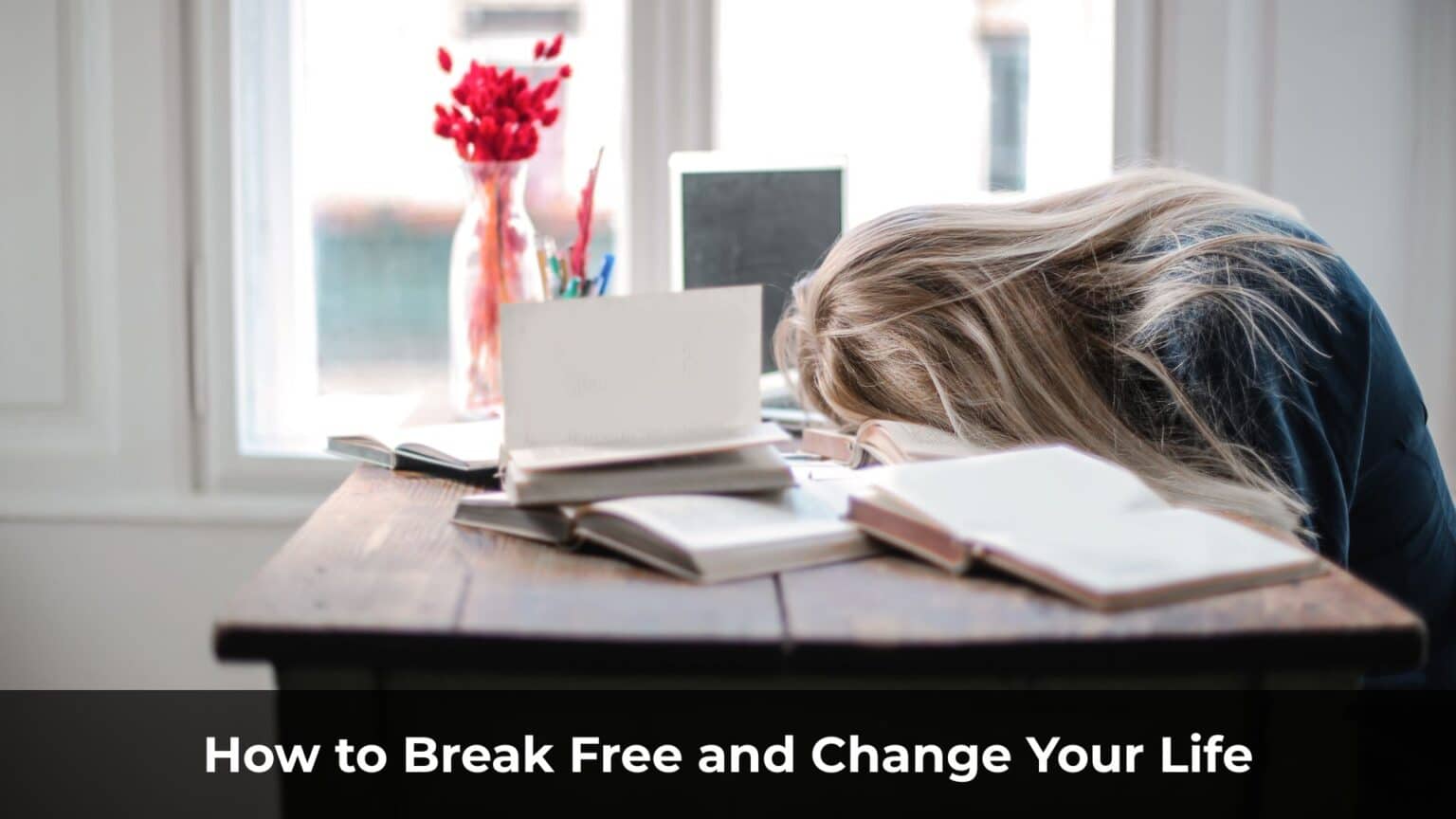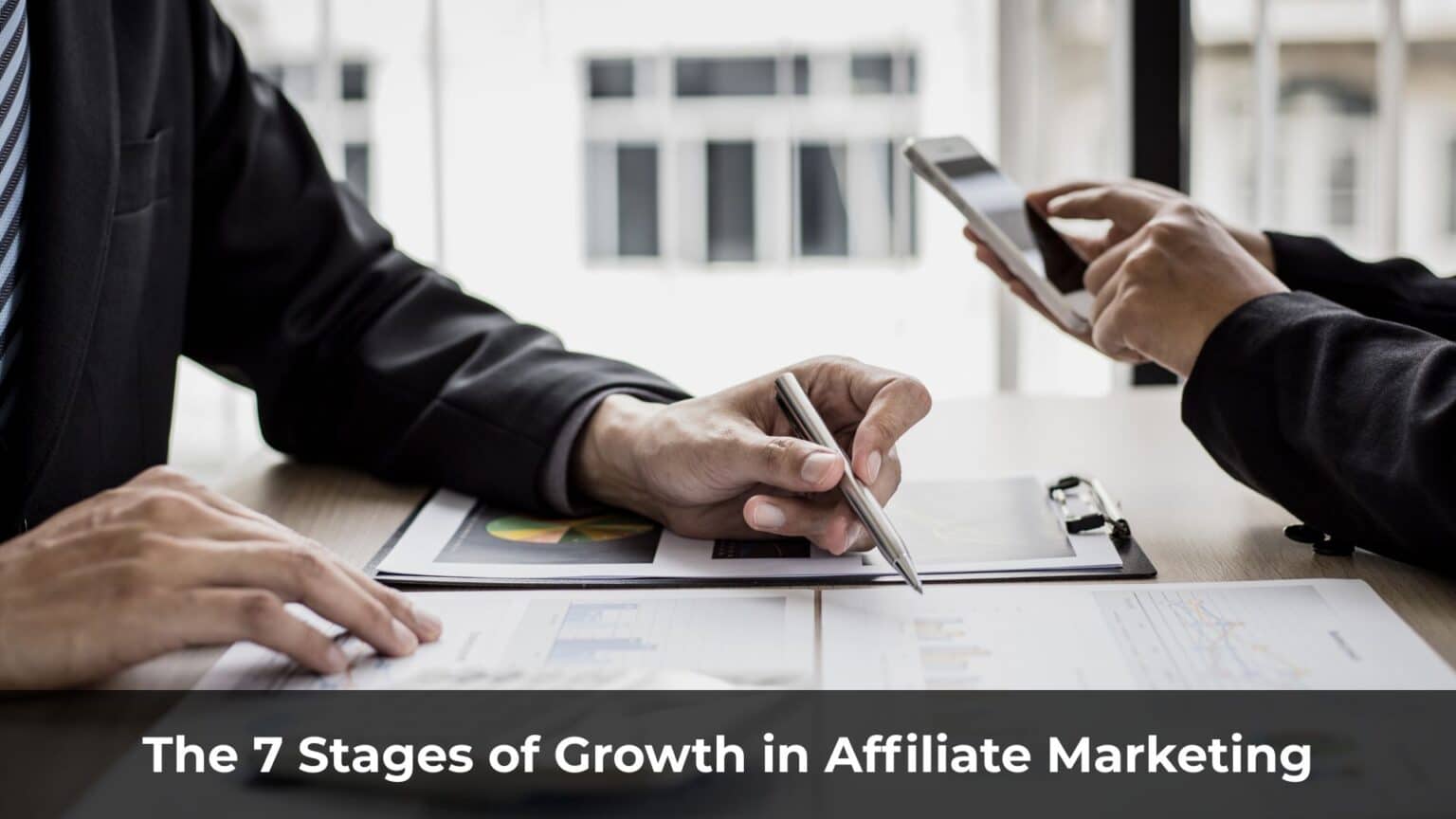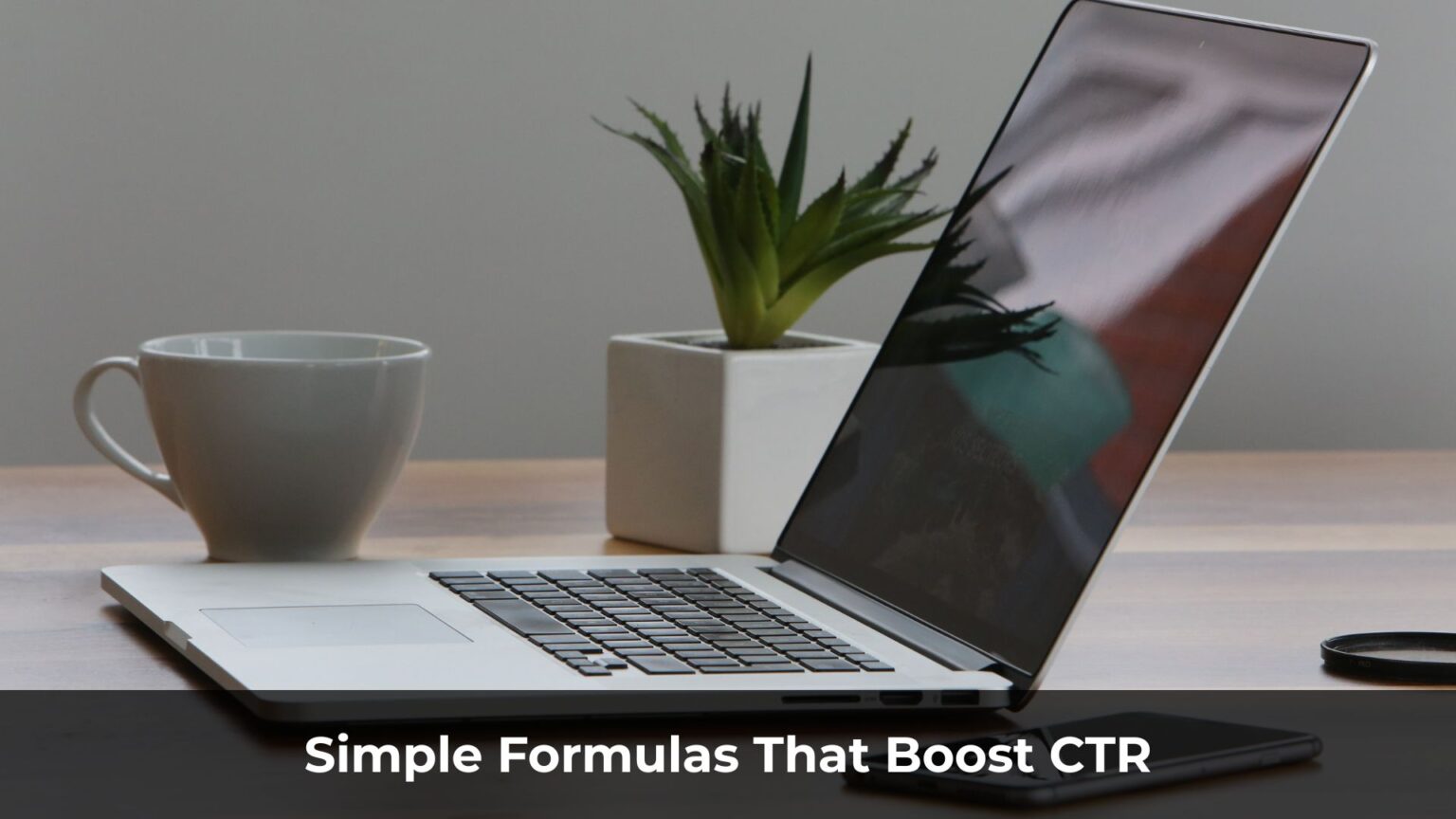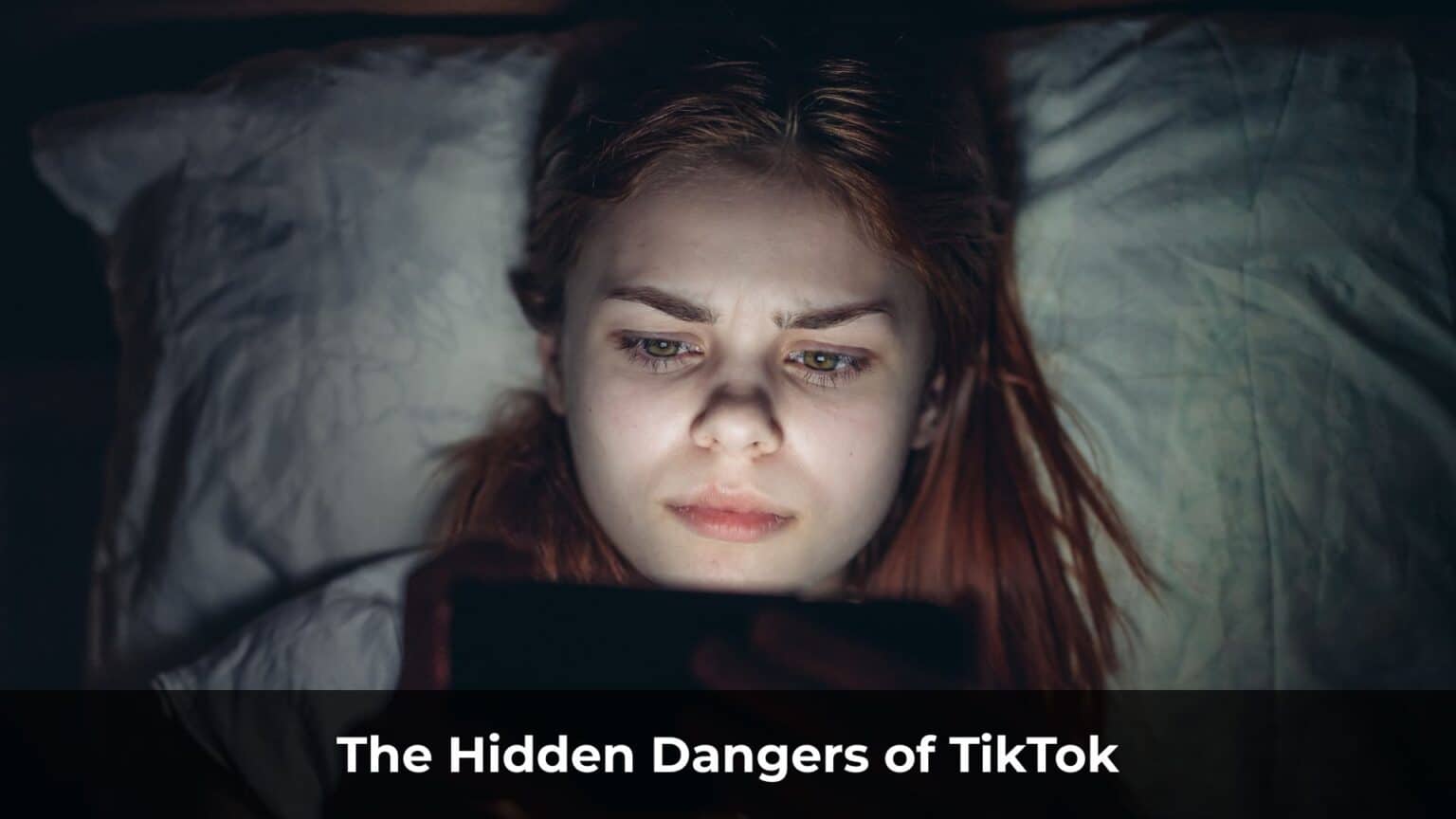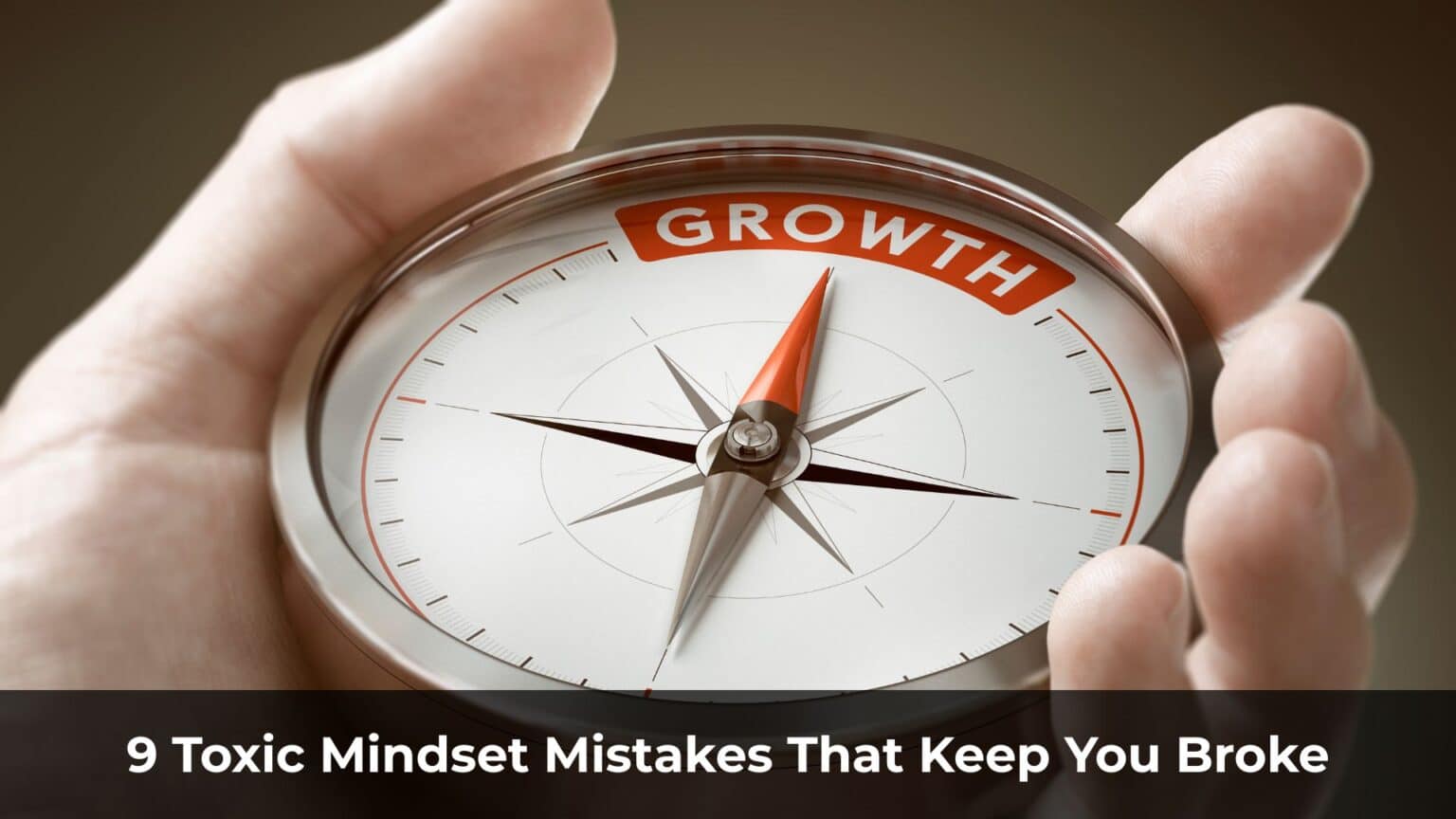“If I had six hours to chop down a tree, I’d spend the first four sharpening the axe.” — Abraham Lincoln.
I couldn’t agree more. In this article, I’ll share with you my own version of “sharpening the axe.” But in my case, the axe is the brain.
When your mind is sharp, you move fast. You think clearly. You cut through complex tasks without wasting energy.
The goal isn’t to become a machine that works endlessly. The goal is to train your brain to work better—so you can finish more in less time, and still have the energy to enjoy your life outside of work.
Your time should belong to you, not be consumed by never-ending to-do lists. Youth and energy are finite. Let’s learn how to use them wisely.
Table of Contents
ToggleQuit Social Media, Sharpen Your Mind
After just two weeks without social media—no Facebook, no endless scrolling—I felt like my brain leveled up. My focus became razor-sharp, and my productivity shot through the roof.
That experience convinced me to make it permanent. I blocked every social media platform on my devices—Facebook, TikTok, all gone. The only one I kept was YouTube, mainly for learning purposes.
To make the block unbreakable, I used Cold Turkey, one of the strongest site-blocking tools I’ve found. Even I couldn’t disable it on a whim. Just to be sure, I layered it with NextDNS to block at the network level too.
The result? Mental clarity like I hadn’t felt in years. Tasks that used to take a full day were now done in three hours—without stress, without fatigue.
How I Tamed YouTube to Stay Focused
YouTube has a lot of valuable content for online business—so I couldn’t block it entirely. But I did block parts of it.
With a Chrome extension like Unhook, you can hide distracting sections such as the homepage, comments, and Shorts. I use it to cut out the noise and focus only on the top 20% of content that actually drives business results.
YouTube Shorts, in particular, are dangerous. They tank your focus, kill your momentum, and are ridiculously addictive. That’s why I also Hide YouTube Shorts to completely remove them from my feed.
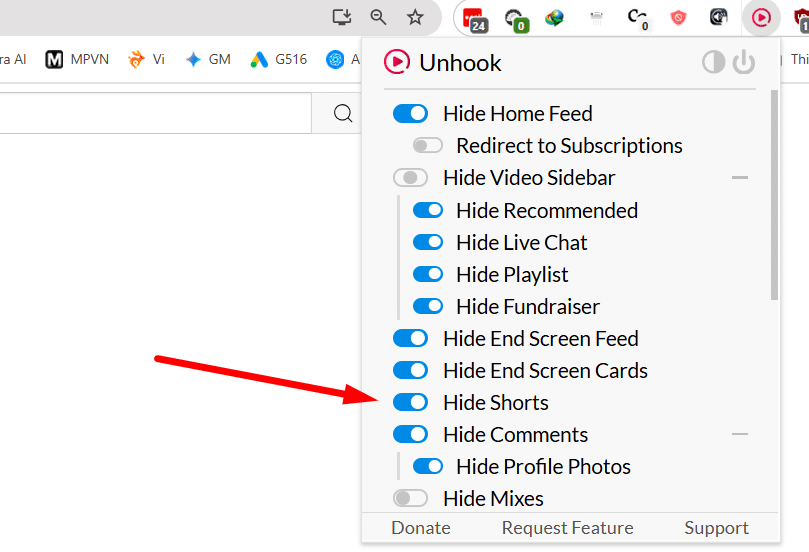
Another tool I recommend is News Feed Eradicator. It replaces YouTube’s homepage with an inspiring quote instead of recommended videos. Technically, Unhook also blocks the homepage, but I use both just to be safe.
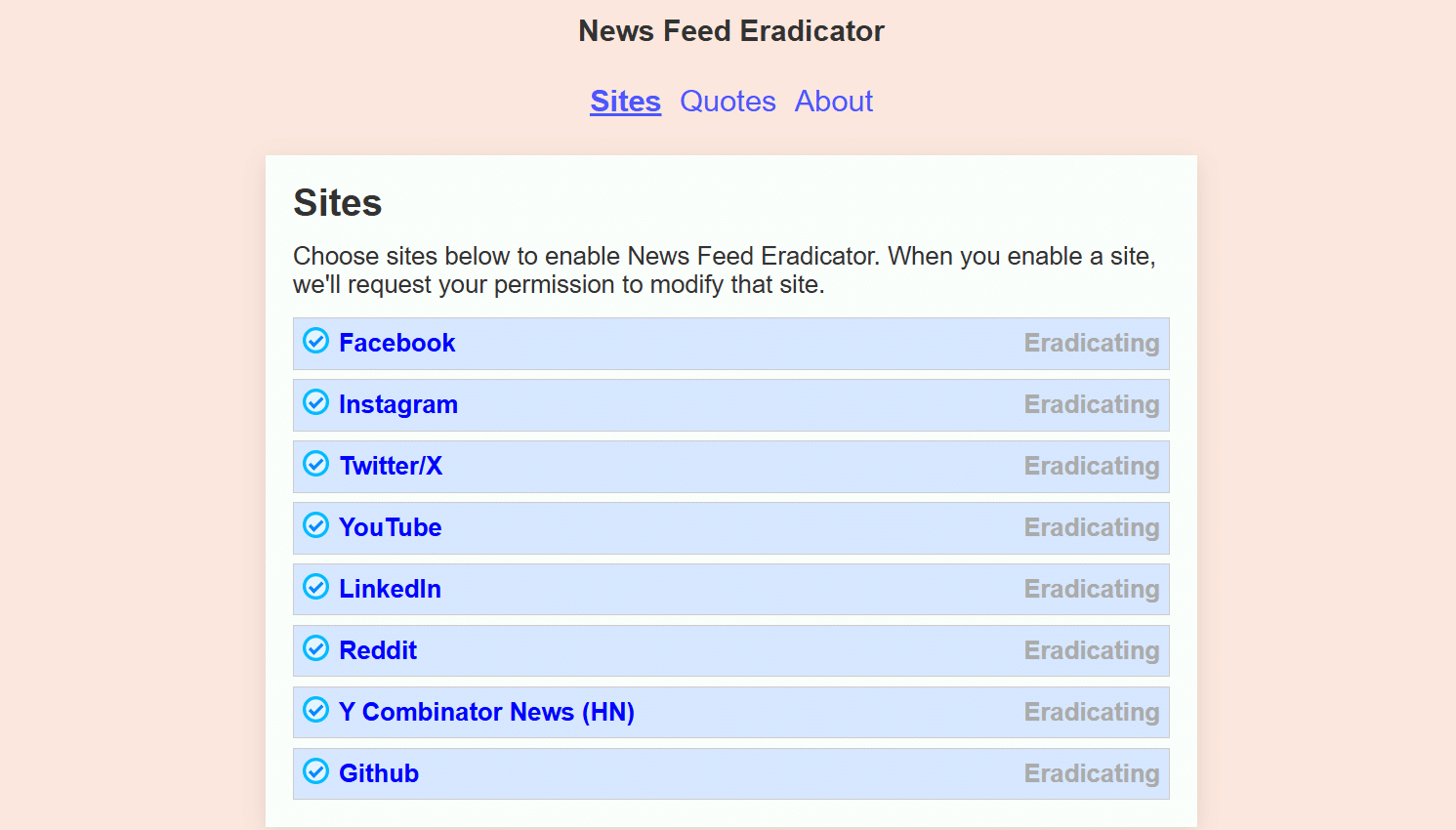
I’ve had days when I woke up feeling clear-headed and ready to work—only to unlock YouTube, get sucked into the homepage, and lose hours watching junk. The whole day would be ruined. My focus gone, productivity wrecked.
And this wasn’t a one-time mistake. It kept happening. Again and again. So I decided: better to be extreme than let my time and energy go to waste.
If you want even more control, Cold Turkey lets you block YouTube entirely. It has a feature where you can unlock access by typing a long, randomly generated paragraph.
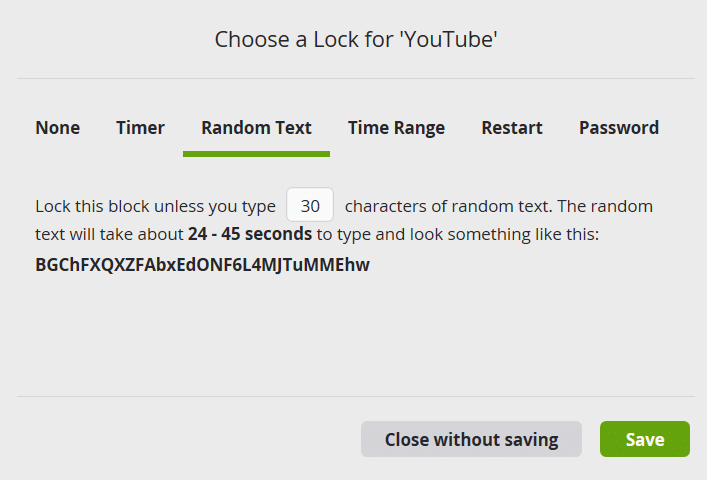
So if you truly need YouTube for work, you can access it—but only if you’re willing to go through the hassle.
Most of the time, that friction is enough to stop me from giving in.
Declutter Your Workspace, Boost Your Output
A clean, minimalist workspace doesn’t just look good—it boosts motivation and makes work feel lighter and faster. When your environment is clear, your mind is too. You get more done, with less mental fatigue.
So take the time to tidy up your desk. Better yet, invest in creating a great workspace. Don’t hold back on spending a bit more—it’ll pay off by saving you countless hours down the line.
A powerful laptop. A well-designed keyboard. A clean, spacious desk. A comfortable chair. Proper lighting. All of it matters. Design your setup with care—it’s where your best work will happen.
Of course, this mostly applies to those who work from home. If you’re stuck in an office, customizing your space might be more difficult.
But for me, online business gave me the freedom to choose when and where I work. I work entirely from home, and I don’t have to answer to a boss. That means I’ve been able to design a workspace that fits me perfectly—and that’s made all the difference.
Digital Declutter: Minimalism for Your Computer
“Less is more.” When you remove the clutter, you see more clearly—both on your screen and in your mind. A clean, well-organized computer can actually lift your mood the moment you sit down to work.
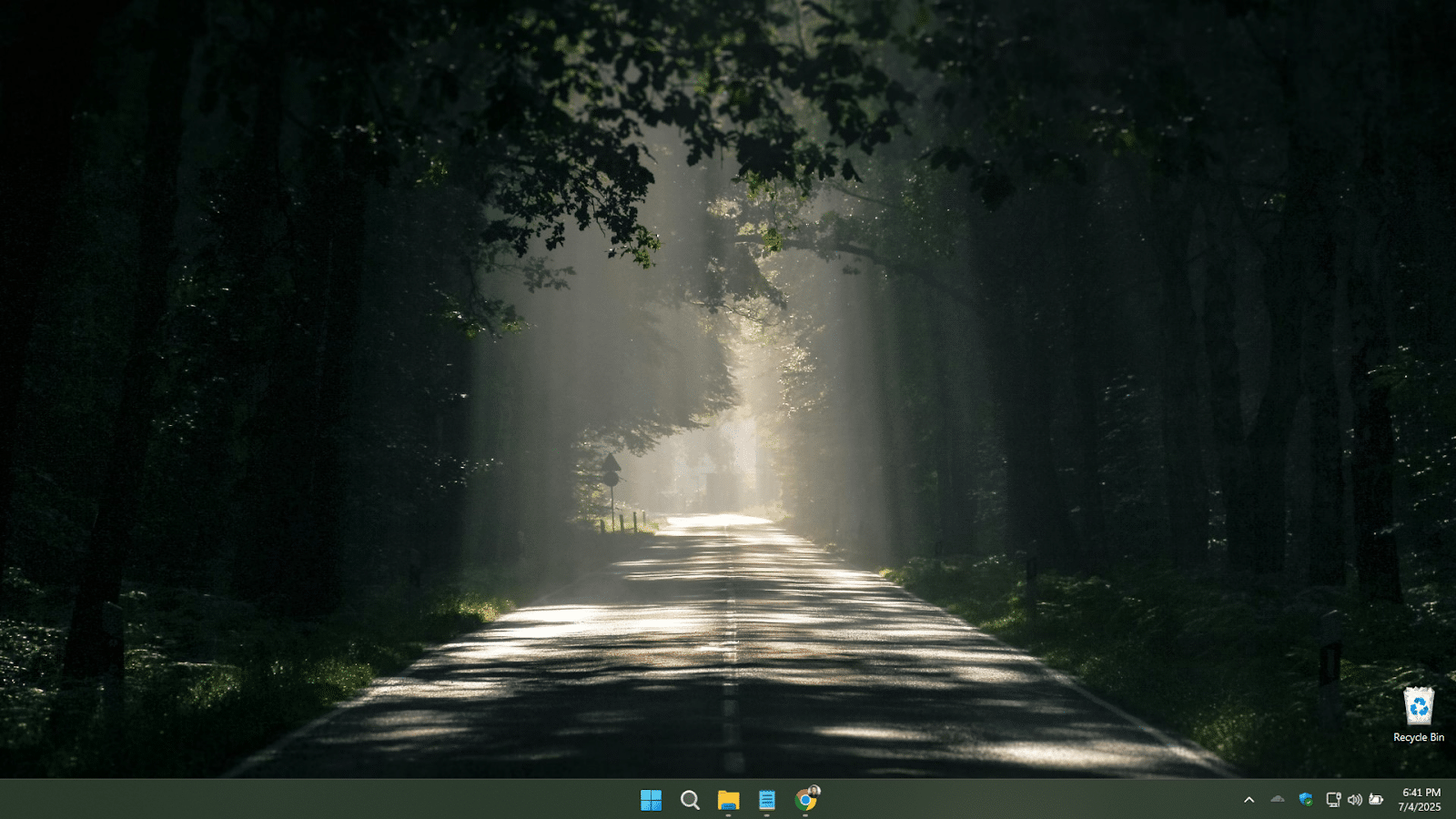
Start by choosing a wallpaper that makes you feel calm and focused. Customize your desktop interface to suit your style. Delete unused apps and files. Keep only the essential tools that directly support your work.
Every time I sit at my desk and look at my screen, I feel a quiet sense of joy. It’s subtle, but powerful. That feeling helps me dive into deep work, stay focused for hours, and get more done—without burning out.
To me, this is one of the greatest perks of online business: I get to do the work I love, and choose the projects I care about. That freedom alone makes the effort worth it.
Why I Don’t Use the Pomodoro Technique
The internet loves to tell you how to work: “Use the Pomodoro method. Work for 25 minutes, rest for 5. It’ll help you focus better.”
But that never worked for me.
I tried the classic 25/5 split, and something always felt… off. It didn’t match my rhythm. Eventually, I realized that my body and brain operate differently. I can dive deep into work for 3 to 5 hours straight—sometimes even 8—without needing a break.
So no, Pomodoro isn’t for everyone. It’s not for me.
And maybe it’s not for you either. The key is: don’t blindly follow what others say, even if it’s popular advice online. Test it. Observe yourself. Find out what truly works for you in the real world.
Tracking My Work Time to Stay Motivated
I don’t follow the Pomodoro method for work, but I do use it to track my time.
With a tool called Focus Commit, I let the Pomodoro timer run in the background. Every 25 minutes, the bell rings—and I simply silence it. That small act is my way of acknowledging: I’ve just completed another focused work session.
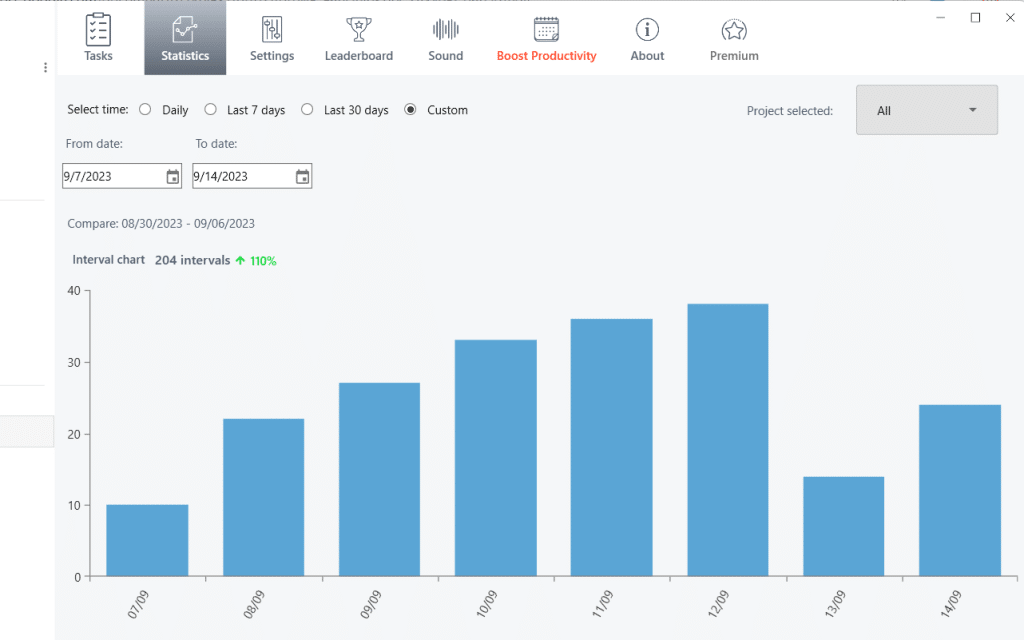
It’s like sending myself a message: “Good job. Keep going.”
That gentle self-encouragement keeps my motivation alive throughout the day.
Instead of taking a 5-minute break after each session, I usually skip the break and let the next 25-minute cycle begin immediately. It works better for my personal flow.
At the end of the week, I review the data—and there it is: visual proof of a productive week. That small sense of progress adds joy to the process. Over time, this habit builds a healthy, sustainable rhythm for deep work.
Start Your Day by Making Your Bed
“If you want to change the world, start by making your bed.”
Right after you wake up, make your bed neatly. It may seem small, but you’ve just completed the first task of the day. That simple win creates momentum—and one task leads to another, and another.
And on the days that feel exhausting, when you come home and see a tidy bed (the one you made), it brings a quiet sense of order and calm. Sometimes, that’s all you need to feel a little better.
Build Healthy Habits, Build a Stronger Body
Everyone says health is important. That’s nothing new—we all know it. But very few people are truly willing to invest in it.
It’s not because they don’t understand the value. It’s because they lack the motivation. Saying it is easy. Actually living it is hard. Building healthy routines takes real effort—but once you succeed, the rewards will stay with you for the rest of your life.
Personally, I don’t do high-intensity workouts. Instead, I practice qigong and sitting meditation in the full-lotus posture. Intense exercise doesn’t suit my body well.
But make no mistake—an hour of full-lotus meditation can feel just as intense. My heart beats faster, blood circulation improves, my mind sharpens, and sometimes my knuckles even crack from the internal pressure. It’s a deep, energizing experience.
I’m not saying you should copy me. Every body is different. The key is to experiment and find the form of physical cultivation that works best for you.
And if you’re older, or your body isn’t strong, pushing yourself with intense workouts may do more harm than good. Listen to your body. Train wisely.
Do the Right Work, Not Just More Work
According to the 80/20 principle, 20% of your tasks create 80% of your results. So the goal isn’t to do more—it’s to focus on the right 20%.
There was a time when I poured a whole month into a business project—working long hours, pushing hard—but it led nowhere. It turned out the project itself was flawed. I had invested time, energy, and focus into something that was fundamentally off track.
That failure taught me an important lesson: success isn’t about how much you do. It’s about doing the right things—especially the high-leverage ones that move the needle.
That’s why I’ve learned to slow down. I set aside time to think clearly. I meditate to quiet my mind. Only with a calm, centered mindset can I make clear, smart decisions.
This becomes even more important as your business grows. The bigger your enterprise, the more costly a bad decision becomes. If a founder chooses the wrong path, the entire company can spiral in the wrong direction.
Clarity isn’t optional—it’s a leadership necessity.
Applying the 80/20 Rule to Everyday Life
The 80/20 rule doesn’t just apply to business—it works wonders in daily life too. Take a look at all the tasks you do. If something isn’t important, don’t do it—or delegate it.
For example, chores like washing dishes or cleaning the floor? My wife handles those (yes, I’m lucky). But of course, I make it a habit to say thank you. Even between husband and wife, gratitude matters.
If you’re a husband, try saying this:
“Thanks for cooking this meal. I’m such a workaholic—I honestly wouldn’t know how to manage without you.”
Yes, I feel a bit awkward every time I say it. But I say it anyway. Just be shameless about it!
Cao Cao, the famous Chinese warlord, was the king of being shameless—and look how far he got. A little appreciation goes a long way when you want people to stay happy working with you.
Okay… that was a tangent. Let’s get back on track.
Take a good look around your home. If there are items you haven’t touched in over a year, be ruthless—get rid of them. A clean, uncluttered space brings clarity and peace of mind. Toss out the 80% that doesn’t matter, and keep the 20% that truly does.
There’s a saying: “A clean home feels cooler, and clean bowls make food taste better.”
To me, the cleanest home is the one with the fewest possessions. The less stuff you own, the cleaner and more spacious your environment becomes.
In some places, unused items can be donated to charity, which is a great way to let go without waste. But even if donation isn’t an option, it’s still worth decluttering. Holding on to things just because you might need them someday only clutters your space—and your mind.
Auto-Lock Your Computer Before Bed
Ideally, you should stop using your computer and phone 1–3 hours before going to sleep. The blue light from screens stimulates your brain, making it harder to relax and fall asleep.
To avoid that, I use a tool called Cold Turkey, specifically its Frozen Turkey feature. I set a shutdown timer, and once the time hits, it automatically locks my computer. And this isn’t just a soft reminder—you can’t unlock it easily. It’s a hard lock, which makes it very effective.
During that 1–3 hour window, I do things that calm the mind: read a book, write in my journal, plan the next day, spend time with family, or listen to meditative music.
Sometimes, I download podcast-style videos I enjoy, convert them to MP3, and play them on a simple music player while I unwind.
How I Broke Free from My Phone Addiction
To be honest, I used to be heavily addicted to my phone. It’s a little embarrassing to admit, but I wasted countless hours scrolling through nonsense and playing mobile games.
At one point, I had spent enough money on in-game purchases to buy a high-end laptop. Regret? Absolutely. But the pull of those games was intense—I simply couldn’t resist.
I consider myself a fairly disciplined adult. And yet, I still failed miserably when it came to resisting the temptations of my smartphone.
So I decided to take control.
Now, I use three different tools to hard-lock my phone:
- BlockerHero – to block adult content and unwanted apps.
- Lock My Phone – a hard lock tool that charges me ~$3 to unlock the phone.
- Lock Me Out – a backup lock in case the other app fails.
With all three “seals” in place, my smartphone became… well, dumb. I can only receive calls and check texts. No mindless browsing. No games. No distractions.
And honestly? I don’t regret it one bit. I’m finally free. I control my phone—it no longer controls me.
And if there’s ever a real emergency? I can still pay the $3 and unlock it. But the friction is just high enough to stop impulse use cold.
Final Thoughts
Success always comes with a price. For me, I gave up the noise, the constant stimulation that modern tools bring—and in return, I gained something far more valuable: inner peace.
But peace doesn’t come passively. It takes self-discipline—every single day.
Think of a kite soaring high in the sky. It can only rise because it’s held by a string. That string is discipline. Without it, the kite drifts aimlessly, tossed by the wind. And so it is with us: if we lack structure and self-control, we’ll be swept away by the chaos of life.
Every day brings a new challenge. But with focus, awareness, and steady discipline, you’ll stay on course.
Wherever you are on your journey, I hope you stay grounded—and keep rising.





